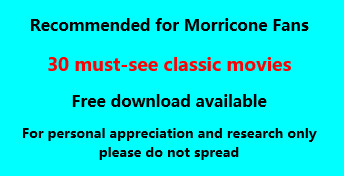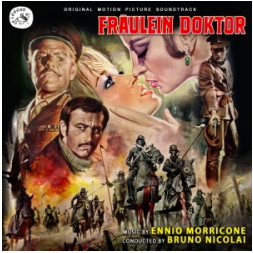FRÄULEIN DOKTOR (1969)
Fräulein Doktor is a spy film directed by Alberto Lattuada (who previously worked with Morricone on Matchless in 1967), loosely based on the life of the real-life World War I undercover agent Elsbeth Schragmüller. Suzy Kendall plays the title role, a seductive espionage expert who uses her intellect, her wits, and her sexuality to uncover military secrets all over Europe on behalf of the Germans – all while the dogged British counter-intelligence agent Colonel Foreman (Kenneth More) tries to stop her. The film features Capucine, Giancarlo Giannini, and Nigel Green in supporting roles, but was banned in some countries upon its release – it has everything from lesbian love scenes, to depictions World War I trench warfare that veer into body horror territory – and has fallen into almost complete obscurity since then.
Morricone’s score for the film falls mainly into two styles: beautiful, classical, elegant romance scoring that relates to the Fräulein Doktor herself, and dissonant, overwhelming music to illustrate the horrors of war. The theme that most people will be drawn to is the Fräulein Doktor theme, which first appears in “Fräulein Doktor on Board the Ship,” and then is re-stated more fully “Fräulein Doktor at the Hotel,” “Champagne and Morphine,” and others. This is truly one of Morricone’s most beautiful themes, in which strings and piano and harpsichord combine in the most gorgeous of ways. Later, “Fräulein Doktor and Dr. Saforet” and “Lesbian Love Scene” underscore the controversial moment when the Fräulein seduces a female chemist so she can obtain a secret formula from her on behalf of the Germans; after some unsettling and hesitant harpsichord passages, the full romance theme emerges again in all its glory, and I especially love how Morricone scored these scenes identically, irrespective of whether the Fräulein was using her guiles on a man or a woman.
On the other hand, the music for the horrors of war sees Morricone at his most challenging and dissonant. Beginning with the “Opening Titles,” Morricone’s music here is unsettling and difficult, filled with nerve-shredding string sustains, rattling percussion ideas, and machine gun sound effects. There are also some moments of tension and suspense too, in cues such as “Disembarking from the Submarine,” “The Watchmaker,” “The Sinking of the Hampshire,” and “The Safe and the Map,” which use string sustains overlaid with nervous tinkling pianos, harpsichords, and snare drum riffs, to underscore the Fräulein as she undertakes the most dangerous parts of her mission.
Other cues of note include “Berlin: At the Restaurant,” an impressionistic, vivid writing for a string quartet, and “Reception at the Embassy,” a lovely piece of classical pastiche.
The film’s big set piece comes in “The Poison Gas Battle at Ypres,” which is sensational – a huge, unstoppable combination of anguished screeching strings, roiling percussion tattoos, screaming brass, guttural choral outbursts, and multiple moments of stark orchestral dissonance. This all comes together to underscore the final scene where – having successfully completed her mission and given the Germans the chemical formula for poison gas – the Fräulein Doktor witnesses them unleashing a gas attack on soldiers in the opposing trenches, with naturally ghastly results. The aftermath of this event causes the Doktor to see the error of her ways, but go insane in the process, distraught by the horror she had indirectly inflicted. The conclusive “Fräulein Doktor Insanity and End Titles” revisits the gorgeous romantic main theme for the final time; elegant, classical, Morricone at his tender and emotional best
The soundtrack, released by the Italian Legend label in 2010 comes with an unhesitating recommendation – the only drawback being the archival sound quality, which is at times quite poor and leaves something to be desired. This one issue aside, Fräulein Doktor is an undiscovered Morricone masterpiece, featuring one of his most beautiful love themes, some of his most challenging dissonance, and a sensational two-cue 11-minute finale that has to be heard to be believed.
Track Listing: 1. Opening Titles (2:26), 2. Disembarking from the Submarine (1:08), 3. Fräulein Doktor on Board the Ship (0:44), 4. Fräulein Doktor at the Hotel (2:22), 5. The Watchmaker (1:54), 6. The Sinking of the Hampshire (2:23), 7. Fräulein Doktor and Dr. Saforet (2:21), 8. Lesbian Love Scene (2:40), 9. Berlin: At the Restaurant (1:38), 10. Champagne and Morphine (1:27), 11. Reception at the Embassy (1:41), 12. The Safe and the Map (1:08), 13. Ruppert Escape (2:03), 14. The Poison Gas Battle at Ypres (8:40), 15. Fräulein Doktor Insanity and End Titles (3:03). Legend CD34-DLX, 35 minutes 38 seconds.












